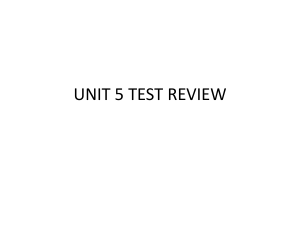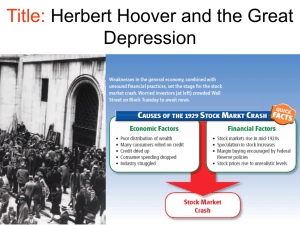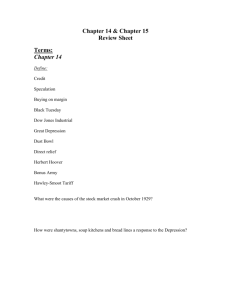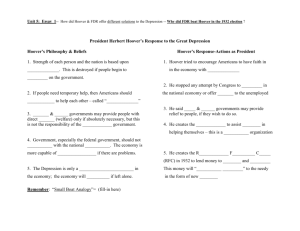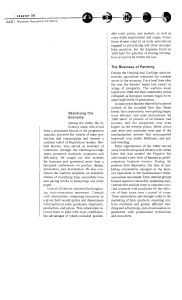Great Depression - Duplin County Schools
advertisement
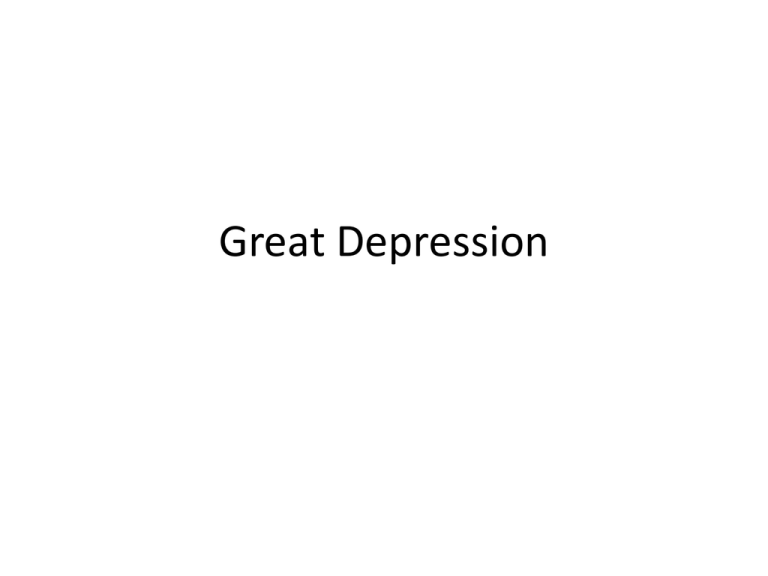
Great Depression Causes of the Great Depression • Stock Market Crash- Black Tuesday- October 29, 1929 – Stock prices had fallen the Thursday before – The wealthy bought a lot to stabilize – Stock prices continued to fall Causes of the Great Depression • Uneven income distribution- wages had not risen that much • Speculation- people bought stock believing the price would go up and they could sell for a quick profit – “Buying on margin”- people borrowed money to buy stock making low down payments; when market crashed, people lost everything Causes of the Great Depression • Excessive use of credit- also called installment buying; 1920s advertising stimulated consumers’ desire to buy goods • Overproduction- businesses produced too much and workers did not have high enough wages to buy them • Weak farm economy- prosperity never reached farmers due to overproduction, high debt, low prices, and drought Causes of Great Depression • Government policies- laissez-faire policies did little to regulate these problems; high tariffs hurt farmers and international trade • Global economic problems- Europe never recovered from WWI; most nations were interdependent in banking and trade Effects • Worst in 1932 • GNP dropped from $104 billion to $56 billion in 4 years • Income declined over 50% • 20% of banks closed • $10 million in savings • 25% unemployment Hoover • Thought prosperity would return • Did not ask for Congress’ help until summer of 1930 • Thought government assistance to individuals would destroy self-reliance • Thought relief efforts should be state level Hoover’s Foreign Response • Hawley-Smoot Tariff- increased tariff to satisfy business owners who thought higher tariffs would protect their businesses – European countries enacted higher tariffs in responses • Suspended Dawes Plan- plan for US to collect war debts; Hoover suspended this plan; many bankers withdrew their money Hoover’s Domestic Response • Federal Farm Board- created in 1929 but powers were expanded; government held surplus grain and cotton in storage; did not stop surplus • Reconstruction Finance Corporation- gave out emergency loans to help businesses; thought loans would “trickle down” to help lower classes • Home Loan Bank Act- gave federal loans to homeowners to prevent foreclosures Despair and Protest • Farmers got together to stop banks from foreclosing on farms and evicting them from their homes – Farm Holiday Association- stopped entire crop of grain to keep it from reaching market • Bonus March- thousands of unemployed WWI vets to demand bonus payments they were promised at a later date (1945) – – – – Bill failed to pass 2 veterans killed Hoover ordered army to break up march/camp Many thought Hoover was uncaring Election of 1932 • FDR nominated for Democrats – Promised a “new deal” • FDR wins in a landslide • Hoover became a “lame duck” – 20th amendment shortened period between election and inauguration
